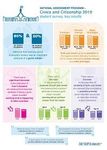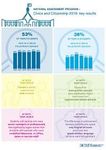Consultation window opens soon for the Australian Curriculum Review
←
→
Page content transcription
If your browser does not render page correctly, please read the page content below
Consultation window opens soon for the Australian Curriculum
Review
On 29 April 2021, the consultation period will open for the proposed revisions to the
Foundation – Year 10 (F–10) Australian Curriculum, including for all the learning areas, the
general capabilities and the cross-curriculum priorities.
A consultation website will be available for interested stakeholders and the public to review the
proposed revisions to the curriculum and have their say via a survey format. The consultation
window will be open until 8 July.
In June 2020, education ministers agreed that it was timely to review the Foundation – Year 10
Australian Curriculum. In preparation for the review, ACARA consulted widely with key
education stakeholders and groups to define the approach and scope of the review. Since
then, ACARA has established specialist teacher and curriculum expert reference groups to
assist with the review and has undertaken extensive discussions with curriculum experts from
jurisdictions and with practising classroom teachers. ACARA has also engaged with national
subject professional associations, academics and other key stakeholder groups.
We will continue to provide further information in the lead-up to the public consultation window
and look forward to receiving all feedback on the revisions during the consult period.
Visit the 'Curriculum review' page of the ACARA website to find out more on the review.
Disclaimer: ACARA supplies communication material to national parent and principal peak bodies for on-forwarding
to members or for inclusion in e-newsletters and web updates. This material may be shortened to suit word and
screen limits, but not edited without ACARA’s approval.ACARA CEO speaks at the SMH Schools Summit
ACARA CEO, David de Carvalho, recently took to the stage as part of the third annual Sydney
Morning Herald Schools Summit to discuss the upcoming Australian Curriculum Review.
“Another way to describe what we are hoping to achieve is that we want to give the Australian
Curriculum the Marie Kondo treatment,” said Mr de Carvalho, who hopes the proposed revised
curriculum will excite teachers.
“We want teachers to go on the public consultation website on 29 April and see a curriculum
that they can’t wait to teach.”
“We look forward to hearing views to help us improve the curriculum and ensure it serves our
children, equipping them with the skills and knowledge they need to live fulfilling lives.”
Whether you are a teacher, a parent, you work in education or are someone who has a
particular interest in it, your feedback is important to us.
Read Mr de Carvalho's full speech (PDF 92 kb).
The NAP–CC national report 2019 released
The results of the National Assessment Program – Civics and Citizenship (NAP–CC) have
revealed Australian students’ performance has plateaued when it comes to understanding the
importance of our democracy and appreciating our national values.
The 2019 report, released in January 2021, shows 38 per cent of Year 10 students have reached
the proficient standard and 53 per cent of Year 6 students have achieved the benchmark.
Disclaimer: ACARA supplies communication material to national parent and principal peak bodies for on-forwarding
to members or for inclusion in e-newsletters and web updates. This material may be shortened to suit word and
screen limits, but not edited without ACARA’s approval.But the student survey results published in the sixth National Assessment Program – Civics and
Citizenship report have also revealed some interesting insights: many students are concerned
about a range of problems affecting Australia, like pollution, climate change and water shortages,
while fewer students are concerned about terrorism.
The program tests students’ understanding of Australian democracy and system of government,
the rights and legal obligations of citizens and the social values that underpin Australian society. It
is undertaken in a sample of schools across the country every three years. A survey of students’
attitudes and engagement with civics and citizenship is also included.
Nearly two-thirds of Year 10 students surveyed have collected money for a charity or social cause,
and there was an increase in the proportion of students at both year levels who believed
participating in peaceful protests about important issues was an important attribute of good
citizenship.
Click the images below to see our infographics on NAP–CC key results and NAP–CC student
survey:
See more information on the NAP website.
Parents and students voice their opinions
We asked parents if they think it is important to talk to their kids about political and social issues,
and what issues their kids seem most interested in and passionate about. Watch the video (1.46
min) to hear what they had to say:
Disclaimer: ACARA supplies communication material to national parent and principal peak bodies for on-forwarding
to members or for inclusion in e-newsletters and web updates. This material may be shortened to suit word and
screen limits, but not edited without ACARA’s approval.The survey shows that students in both Years 6 and 10 continue to believe that learning about
Australia’s history is an important attribute of being a good citizen. However, there is a significant
decrease in the number of Year 6 students who believe that important attributes of being a good
citizen include learning what is happening in other countries. We asked a few students about their
thoughts on these issues. Watch the video (4.36 min) to hear what they had to say:
Handy resources for parents on the curriculum
It is parents, families and carers who have the most influence on their children. When families
are actively involved in their children’s education, children usually enjoy school and achieve
better results.
The ‘Parent information’ section of the Australian Curriculum website provides information for
families and carers about their children and the Australian Curriculum.
Download the Australian Curriculum: an overview for parents to learn about how the Australian
Curriculum is organised, including information about the learning areas, general capabilities
and cross-curriculum priorities.
Disclaimer: ACARA supplies communication material to national parent and principal peak bodies for on-forwarding
to members or for inclusion in e-newsletters and web updates. This material may be shortened to suit word and
screen limits, but not edited without ACARA’s approval.NAPLAN: the 'when?' and 'what?'
As NAPLAN is less than two months away, your child's school may soon send information
about the annual literacy and numeracy tests for all Year 3, 5, 7 and 9 students. NAPLAN test
dates are:
NAPLAN 2021 paper test window: 11–13 May
NAPLAN 2021 online test window: 11–21 May
Further information about the NAPLAN test windows is available on the NAP website.
Did you know?
In 2021, over 70 per cent of schools across Australia will be participating in NAPLAN Online.
This means students in these schools will be doing the literacy and numeracy tests on a
computer, tablet or laptop. You can check with your child's teacher whether your son or
daughter will be doing NAPLAN Online or on paper. Watch the video about NAPLAN Online.
At ACARA, we develop the tests, based on the content of the Australian Curriculum. So there
is really no need for any special preparation – what students learn in the classroom is what
they are tested on in NAPLAN. When NAPLAN comes around each year, there is always a lot
of talk on social media and in the news, and sometimes this can cause anxiety. The adults in
children's lives can lessen any anxiousness by putting NAPLAN in perspective. You can
remind your child that NAPLAN is a simple check to see how they are going with writing,
spelling, reading and maths. That it is ok to be a bit nervous – a bit like being nervous before a
swimming carnival or a soccer game. And that all they can do is their best.
ACARA has developed a public demonstration site for NAPLAN Online as a familiarisation tool
for students to see the range of question types, onscreen tools, timers and the interactive
navigation. For students participating in NAPLAN on paper, sample tests and answers from
2008 to 2016 are available.
Read the information brochures for parents and carers to find out more about NAPLAN and
NAPLAN Online.
Accessibility options for students
Information about adjustments for students with disability and students with diverse learning
needs are available on the NAP website, including some example adjustment scenarios. To
find out about adjustments available for your child, please speak with your school. Schools will
need to liaise with the test administrations authority responsible for administering NAPLAN in
your state or territory about appropriate adjustments for students.
Disclaimer: ACARA supplies communication material to national parent and principal peak bodies for on-forwarding
to members or for inclusion in e-newsletters and web updates. This material may be shortened to suit word and
screen limits, but not edited without ACARA’s approval.You can also read
























































